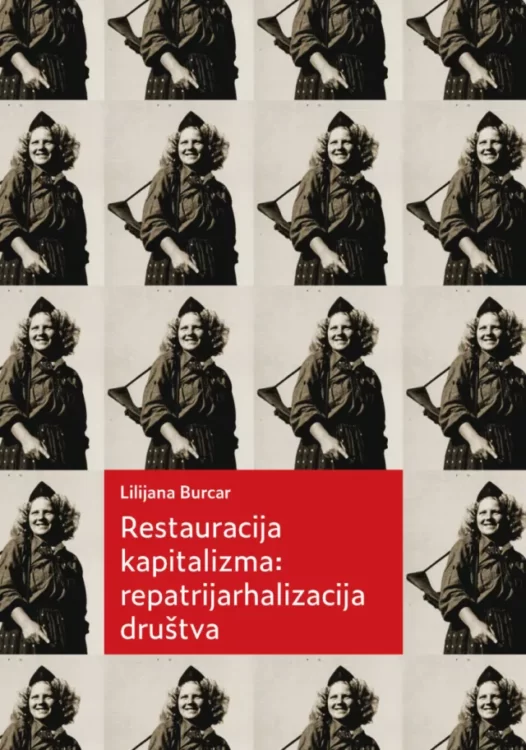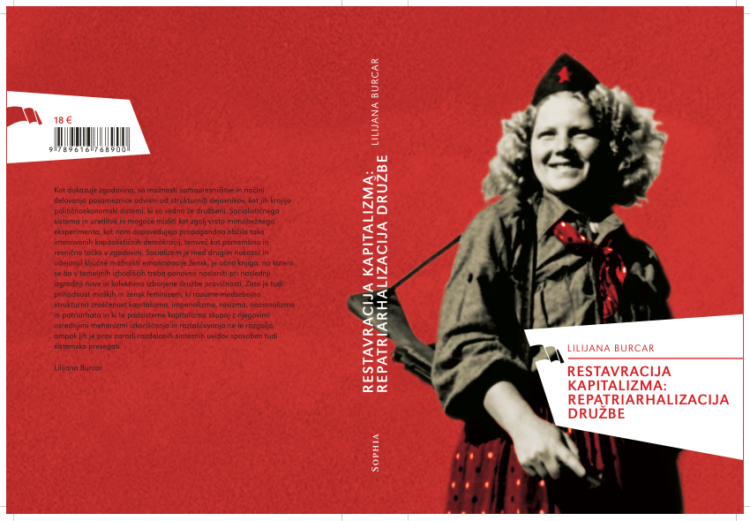Restoration of Capitalism: Repatriarchalization of Society (Book review)
BOOK REVIEW: Lilijana Burcar, Restauracija kapitalizma: repatrijarhalizacija društva, Zagreb: Institute of Ethnology and Folklore Research, Centre for Women’s Studies, 2020
Socialist history and legacy have been explored largely from the hegemonic, Western perspective in the globalized (academic) world, and the authors have been forced to ‘catch up’ with the West. So called Eastern European Studies too often and uncritically fit this compromise. Although the ‘guilt’ of imputed (Eastern) immaturity is a rather clear symptom of unequal power relations between the centre and periphery in the academic world (as well), it is based on the widely accepted thesis that development of democracy and a just society in that part of the world had been suspended by socialism. This seemingly universal perspective not only results in a distorted image of socialist history, but also dampens its emancipatory lessons and potential.

The author of the book reviewed aims to break with this intellectual and political status quo and is committed to regenerating Marxist conceptual apparatus for an analysis and critique of social changes that – together with the restoration of capitalism – have deeply affected post-socialist spaces. The book was originally published in Slovenian in 2015 by Sophia Založba, and translated into Croatian in 2020. The large list of initiatives in the author’s acknowledgment note reveals a long (and shared) process of reflection on research material and building of valuable analytical insights. The book represents remarkable research and a monumental intervention in the questions of the relationship between capitalism and patriarchy (or – as title states – the restoration of capitalism and repatriarchialization of society) and covers socialist Yugoslavia and compares Western and Eastern Europe in the same period. It is therefore not just a valuable contribution to the topic, but also gives wings to the socialist feminism that – in the post-socialist space together with the restoration of capitalism – has been defeated by its liberal stream. Lilijana Burcar dismantles conservative as well as liberal gender politics that push reproductive work, together with its costs, in the private sphere alike, thus domesticating women as its natural performers, and opposes those socialist politics that strive for socialization and collective responsibility of reproductive work, and in that way encourages women’s emancipation. By taking a clear political position in her analysis, Burcar does not exempt western Marxist feminists nor the “new” post-socialist Marxist left (as she calls it).
The point of departure is the thesis that capitalism and socialism are two different political-economic systems, thus different social organisations, and as such they constitute two different “socio-economic citizenships” for women. Capitalism tends to strengthen patriarchy, while socialism disintegrates institutional patriarchy and thus weakens it. Therefore, Burcar embraces a unitary theory that insists on the entanglement of gender and class in capitalist society, and therefore the simultaneous and interdependent processes of oppression and exploitation. Socialist feminism – as the birthplace of the unitary theory – sees capitalism as a system, and patriarchy as one of its operating principles and “one of constituent (sub)elements that are of key structural importance for the greater accumulation of private capital.”[1] In the first chapter, Burcar elaborates the historical fusion of patriarchy and capitalism; industrial capitalism has transformed and adjusted patriarchy in order to get rid of reproduction costs and so broaden the space of exploitation by establishing a nuclear patriarchal family, a bread-winner-model and public-private dichotomy, as two not only separated but conflicted spheres. The latter, ideological manoeuvre has separated reproductive work from economic activity, pushed in the private sphere and ‘naturally’ assigned to women. The consequences of the construction of woman as a ‘a dependent member’ of a household are far-reaching: it is not only that capital frees itself of the reproduction costs and in that way heightens accumulation, but does so even when women are admitted to enter the labour market through forms of employment that are quasi sympathetic to women, so as to help them fulfil their natural role of mother-housewife, such as flexible forms of employment, part-time-work, work-at-home(!) or work in family businesses. These topics are largely elaborated in the fifth, final chapter. Demonstrating at the beginning that capitalism has historically and structurally been directly dependent on the domestication of women, and that it thus treats women and men differently, Burcar closes the book explaining how to adapt to the new requirements; patriarchy institutionally renews and naturalizes itself anew in its neoliberal version. Patriarchal patterns are historically specific and closely tied to the socio-economical type of exploitation: capitalism.
In contrast, socialism – as a fundamentally different socio-economic system – has, together with the reorganization of ownership relations, abolished the bread-winner-model as one of mechanisms of institutionalized patriarchy. The second chapter analyses this dissolution of women’s economic dependency on men and of their encasement in family as the basis of women’s emancipation and subjection as socio-economic equal citizens. Burcar detects four grounds for such socio-economic emancipation: permanent and full-time employment, individual social rights, socialization of educational and care work, and full maternity and parental leave benefits. She reads socialist politics in each of these structural pillars of fully economic and social citizenship for women in parallel with the Western European models existing at that time and clearly sets out their systemic differences. Emancipatory politics were systemically translated into institutional mechanisms and expanded infrastructure that built a different position of women in family and society. Contrary to these socialist politics, Western models, in both of its versions – corporate-conservative, as well as the liberal one that is characteristic for social state – only updates, and basically reproduces a bread-winner-model and a woman as a dependent member of a family. Analysing maternity and parental leave, the author demonstrates that both, a short-term and underpaid one as well as a multiannual and underpaid role, have the same negative effects on the independence of mothers and systematically turns them into a second-rate labour force. In doing so, she pays particular attention to the Scandinavian countries, i.e., the social-democratic model, which is regularly perceived as ideal, or a fulfilment of the socialist tendencies in the framework of a developed capitalist country. Nevertheless, as Burcar shows – referring to research by feminist sociologists – that model has stalled on the road of women’s emancipation, caught between privatisation and the socialization of reproductive work.

Socialist politics and their monumental contribution to the participation of women in social life should be seen through all four above mentioned grounds: permanent and full-time employment, individual and not family-based social rights, full maternity and parental leave benefits, accompanied by building a broad network of socialized, affordable and accessible educational services, as well as care for elderly and disabled people. Burcar dedicates the third chapter to these systemic emancipatory solutions, which are – according to the author – in the post-socialist space not only institutionally dismantled, but completely displaced from feminist activism, as well as in the framework of what she calls “new post-socialist Marxist left.” It is, on the one hand, a consequence of “uncritically accepting the narrow conceptual guidelines of liberal feminisms, which have established themselves in the Western capitalist system in the last decades, and in the 1980s have been constituted as a form of the feminist export product for the east.”[2] On the other hand, it is a consequence of the weaknesses of Western European Marxist feminist theories. Contrary to socialist feminism, Marxist feminism – using a dual systems theory – introduces the concept of public and private patriarchy. In doing so, it tacitly accepts the liberal position and denies the systemic interdependence of capitalism and patriarchy, as well as the concurrency of oppression and exploitation.
Why such a unitary perspective on patriarchy in its fusion with capitalism is needed, the author demonstrates in the fourth and fifth chapters. In these chapters, she focuses on the restoration of capitalism in the once socialist countries of Central and Eastern Europe with respect to the accompanying processes of the repatriarchalization of society. She detects the disintegration of full socio-economic citizenship for women in the changes of labour legislation and social politics, in the length and compensation for maternity and parental leave, and in the parallel disintegration of public infrastructure for the care of children and the elderly. She analyses the ‘transitional’ cases of Hungary, Czech, Russia, Poland, Slovenia and Croatia, and East Germany. In doing so, she gives special status to Yugoslav socialism, and concludes that this particular socialist model has shown a rapid disintegration of the educational and care infrastructure at the very beginning of regressive processes. Namely, unlike countries of the Eastern bloc, which have tied this institutional network to the factories and workplaces, Yugoslavia had positioned them in the communes, and that ensured their better and broader accessibility. This opens a space for a critique: the author emphasizes the specificity of Yugoslav socialism, but never touches on its uneven development, and the parallelism of socialist and capitalist processes that shaped socialist Yugoslavia from its early period. Naming the achievements of Yugoslav socialism, she focuses on the developed north and basically on Slovenia. However, it will be interesting to see how emancipatory politics was institutionalized in the rest of the country, especially in the south.
In what follows, the author dismantles paternal and parental leave for fathers. In the framework of capitalist society and without socialization at the end of the day, this instrument, as her analysis shows, has no assumed emancipatory effects. The final fifth chapter is dedicated to the newest neoliberal politics, revealing the gendered face of the flexibility of labour. These flexible forms of labour, as quasi women-friendly institutes – part-time work, wage labour from home or in family businesses as well as micro crediting – basically hide and only strengthen the bread-winner model that systematically pushes women into economic dependency and poverty.
Burcar concludes that accepting dual system theory has been a fatal error that has “horrible political consequences” in the historical moment when we desperately need a unitary theory, “because in the post-socialist society, in front of our eyes and on demand of the capital, an upgraded bread-winner-model returns, and with it a repatriarchalization of society.”[3] Echoing the starting thesis, this dark conclusion which form the third chapter functions as a key for reading the whole book. One of its major recommendations lies in the author’s open motivation, which is rare in (self-conceited) academic literature and which is supported by statistical data, as well as by thorough comparation of the capitalist model in Western Europe and the socialist model in the East. Without understanding the structural fusion of patriarchy and capitalism and its other subsystems such as imperialism, racism, nationalism, which all support its central modus operandi – exploitation – it is not possible to imagine its overthrow. “As history teaches us, its overthrow is not possible without revolutionary change of the material basis at the very start.”[4]
By: Vesna Vuković
[1] Burcar, Lilijana, Restauracija kapitalizma: repatrijarhalizacija društva, Zagreb: Institute of Ethnology and Folklore Research, Centre for Women’s Studies, 2020, p 162 (all translations to English are mine)
[2] Ibid. p. 121
[3] Ibid. p 175
[4] Ibid. p. 313




